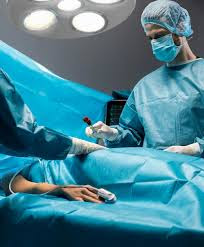Diet and Lifestyle Changes Before and After a Liver Transplant
A liver transplant is a life-saving procedure for those suffering from end-stage liver disease or acute liver failure. However, the journey doesn’t end with the surgery—it begins with comprehensive lifestyle changes that can ensure long-term success. Working closely with a Liver Transplant Physician is essential, as they guide patients through the dietary and lifestyle adjustments needed both before and after the transplant to support healing, prevent complications, and maintain a healthy liver function.
Why Lifestyle Changes Matter
Your liver is vital for detoxifying your body, producing essential proteins, and managing nutrients. If your liver is failing, your entire system is compromised. Once you are listed for a transplant, making lifestyle changes can help stabilize your condition and improve your readiness for surgery. After the transplant, your new liver will need protection and support to function optimally.
That’s why your Liver Transplant Physician will often collaborate with dietitians, therapists, and other specialists to build a personalized plan aimed at maximizing your liver’s health before and after surgery.
Pre-Transplant: Preparing Your Body
Before undergoing a liver transplant, your primary goal is to be in the best possible health to tolerate the surgery and recover successfully. This involves:
1. Adopting a Liver-Friendly Diet
A low-sodium, high-protein, nutrient-rich diet is crucial. Reduce processed foods, avoid saturated fats, and limit salt intake to reduce fluid retention. Incorporate lean meats, fruits, vegetables, whole grains, and healthy fats.
2. Limiting Alcohol and Toxins
Complete abstinence from alcohol is mandatory. Alcohol exacerbates liver damage and disqualifies many from being eligible for a transplant. Also, avoid over-the-counter medications that can strain the liver, like acetaminophen, unless cleared by your physician.
3. Maintaining a Healthy Weight
Obesity increases surgical risks and post-operative complications. Losing weight safely under the guidance of your transplant team is often recommended.
4. Physical Activity
Light to moderate exercise helps maintain muscle tone and boosts cardiovascular health. Walking, stretching, and yoga can be beneficial.
5. Mental Preparedness
Dealing with a liver transplant journey can be mentally challenging. Support groups, counseling, and open discussions with your Liver Transplant Physician can prepare you emotionally for the road ahead.
Post-Transplant: Supporting Your New Liver
After a successful liver transplant, your focus shifts to protecting your new organ and rebuilding your strength. This includes:
1. Nutrition for Healing
Initially, your diet may be limited to bland, easy-to-digest foods. Over time, you’ll shift back to a balanced diet, rich in fruits, vegetables, lean proteins, and whole grains. Eating smaller, more frequent meals can help during the early recovery stages.
2. Managing Medications and Side Effects
You’ll be on lifelong immunosuppressant medications to prevent rejection. These can affect appetite, blood sugar levels, and kidney function. Regular consultations with your Liver Transplant Physician help monitor and adjust medications appropriately.
3. Preventing Infections
Due to immunosuppressants, your body’s defense is lowered. Avoid raw or undercooked foods, maintain proper hygiene, and limit exposure to sick individuals.
4. Avoiding Harmful Substances
Alcohol and recreational drugs are strictly prohibited. Even some herbal supplements and over-the-counter meds can interfere with liver function or immunosuppressants.
5. Reintroducing Exercise
Gradual reintroduction to physical activity is essential. Start with walking and slowly add strength exercises to rebuild muscle tone and energy.
The Role of Ongoing Support
Even years after surgery, maintaining a healthy lifestyle is vital. Regular follow-ups with your Liver Transplant Physician allow for early detection of potential complications like rejection, infection, or recurrence of the original liver condition. Long-term success depends not just on the surgery but on how well you adapt and maintain these changes.
Conclusion: Partnering with Your Liver Transplant Physician for a Healthier Life
A liver transplant is a second chance at life, but it comes with responsibilities. From eating right to exercising and managing medications, every choice contributes to the longevity of your new liver. Your Liver Transplant Physician plays a central role in guiding you through this transformation—offering not just medical expertise but long-term care and support.




Comments
Post a Comment